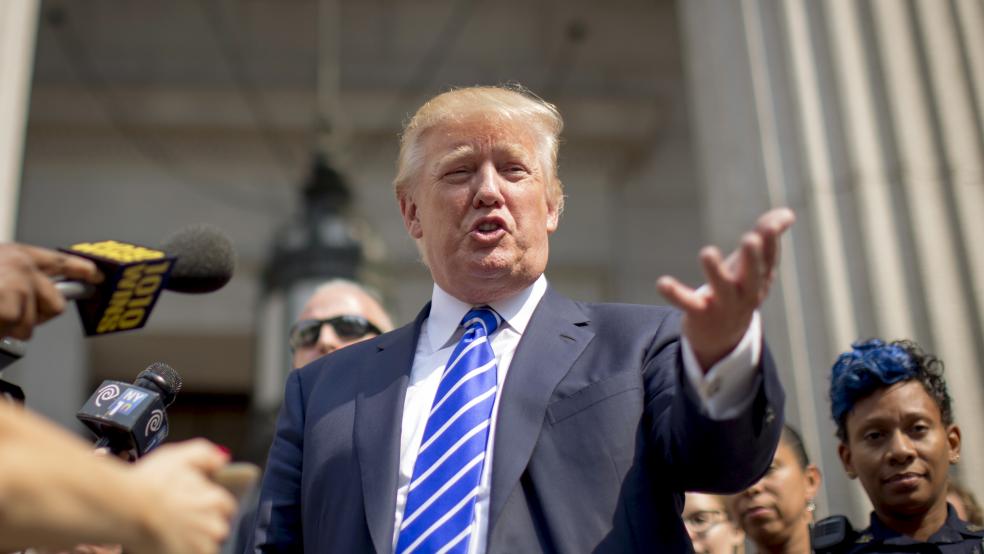Back in March, Republican voters surveyed said by a margin of 57 percent to 37 percent that they valued experience and a proven record over new ideas in evaluating the 2016 presidential field.
Today, they have a diametrically opposite view of that question, with more than two thirds of registered GOP voters (65 percent of the total) saying it is more important that a candidate have new ideas than experience and a proven record.
Related: Why Donald Trump Is Vladimir Putin’s Favorite Presidential Candidate
Those and other findings in a new Pew Research Center survey of the partisan perspectives on the presidential campaign confirm the profound impact billionaire businessman Donald Trump and two other political “outsiders” have had on the thinking of average Republicans in sizing up the presidential field.
In an open ended question about who would be their first choice for president, 25 percent of the likely GOP primary voters selected Trump, followed by retired neurosurgeon Ben Carson with 16 percent and former Hewlett-Packard CEO Carly Fiorina, who was tied with Sen. Marco Rubio (R-FL) for third with eight percent each.
Trump, Carson and Fiorina all have made a virtue of being Washington “outsiders” and have vowed to shake up the political status quo. Since Trump burst onto the national political stage June 16 vowing to rid the country of illegal immigrants and restoring the country to greatness, he has tried to rewrite the GOP political narrative to one favoring political novices with big ideas and strong conservative convictions.
Related: Trump Walks Into an Ambush in Second GOP Presidential
Republican primary voters are inclined to back a candidate who wants to end the recently concluded U.S.-Iran nuclear deal, cut off federal funding for Planned Parenthood, and send ground troops to fight ISIS in Iraq and Syria, according to the Pew poll. They are far less inclined to back a candidate who compromises with Democrats or wants to raise taxes on the wealthy.
Trump, the frontrunner, certainly performs well on most of these issues with the exception of taxes. His comprehensive tax reform proposal would end a number of highly lucrative tax loopholes for hedge fund managers and other wealthy Americans.
In contrast, Democratic voters appear to be more evenly divided over what makes the ideal candidate: Fifty percent say it’s more important for a candidate to have government experience and a proven record while 42 percent attach more importance to new ideas and thinking outside the box, according to the survey.
This view has changed little since March, according to Pew, and would seem to play to the strength of former secretary of state Hillary Rodham Clinton, a one-time U.S. senator and first lady, who has more federal government experience by far than any of her rivals for the nomination.
Here’s Why Donald Trump Is the ‘Mean Girl’ of the GOP
However, an ever metastasizing controversy over her handing of government emails while she headed the State Department and widespread voter suspicion that she is not telling the truth have seriously wounded her once promising prospects to win the nomination.
Sen. Bernie Sanders of Vermont, the self-styled Democratic socialist who has mounted a surprisingly effective challenge against Clinton, can hardly be considered an outsider after decades of experience as the mayor of Burlington, Vermont, and as a member of the House and Senate.
Yet Sanders is running as a populist who shuns the political establishment and who is closely aligned with the party’s left wing. New social service ideas regularly bubble up from his presidential campaign, including tuition-free public colleges, massive infrastructure construction, expanded Social Security benefits and a single-payer national health care program.
Related: Trump Explains What Would Get Him Out of the Presidential Race
While both Clinton and Sanders have distanced themselves from the Obama administration on key economic, trade and foreign policy issues, 61 percent of the Democratic voters surveyed said they would be more likely to support a candidate who offers plans similar to those of the Obama administration.
That might be good news for Vice President Joseph Biden if he decides to make a late entry to the Democratic primary contest this month. Biden would have no choice but to defend the administration’s policies to the hilt, even as he offers his own ideas for a new Democratic administration.
More than 60 percent of Democrats surveyed favor a candidate who is willing to compromise with the Republicans, while there is substantially less interest in candidates who want to cut the size of banks, expand trade agreements and back the U.S.-Iran nuclear deal.
Related: Related: The Trump Insult-athon’s Latest Target: Ben Carson
The survey echoes the findings of a Washington Post-ABC News poll in mid- September showing that support for traditional politicians like former Republican Florida governor Jeb Bush and former Sen. Rick Santorum (R-PA) continues to decline. More than seven in ten Americans said, “People in politics can’t be trusted,” according to the poll.
The new Pew survey of registered voters conducted Sept. 22-27 suggests that Republicans are more satisfied with their field of candidates – and more engaged in the campaign – than Democratic voters are.
As for the issues of greatest concern to voters across the board, the economy continues to rank first among 83 percent of those surveyed last month by Pew. That is followed by health care (73 percent), terrorism (71 percent), the federal budget deficit (68 percent and foreign policy (64 percent). There is lesser concern about immigration (59 percent), the environment (55 percent) and abortion (41 percent).





